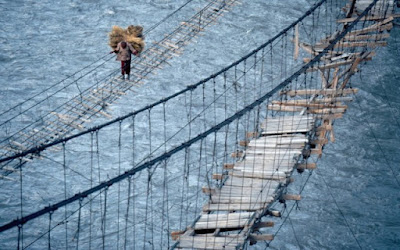
It is hard to have hope. It is harder as you grow old,
for hope must not depend on feeling good
and there is the dream of loneliness at absolute midnight.
You also have withdrawn belief in the present reality
of the future, which surely will surprise us,
and hope is harder when it cannot come by prediction
any more than by wishing. But stop dithering.
The young ask the old to hope. What will you tell them?
Tell them at least what you say to yourself.
Because we have not made our lives to fit
our places, the forests are ruined, the fields eroded,
the streams polluted, the mountains overturned. Hope
then to belong to your place by your own knowledge
of what it is that no other place is, and by
your caring for it as you care for no other place, this
place that you belong to though it is not yours,
for it was from the beginning and will be to the end.
Belong to your place by knowledge of the others who are
your neighbors in it: the old man, sick and poor,
who comes like a heron to fish in the creek,
and the fish in the creek, and the heron who manlike
fishes for the fish in the creek, and the birds who sing
in the trees in the silence of the fisherman
and the heron, and the trees that keep the land
they stand upon as we too must keep it, or die.
This knowledge cannot be taken from you by power
or by wealth. It will stop your ears to the powerful
when they ask for your faith, and to the wealthy
when they ask for your land and your work.
Answer with knowledge of the others who are here
and how to be here with them. By this knowledge
make the sense you need to make. By it stand
in the dignity of good sense, whatever may follow.
Speak to your fellow humans as your place
has taught you to speak, as it has spoken to you.
Speak its dialect as your old compatriots spoke it
before they had heard a radio. Speak
publicly what cannot be taught or learned in public.
Listen privately, silently to the voices that rise up
from the pages of books and from your own heart.
Be still and listen to the voices that belong
to the streambanks and the trees and the open fields.
There are songs and sayings that belong to this place,
by which it speaks for itself and no other.
Found your hope, then, on the ground under your feet.
Your hope of Heaven, let it rest on the ground
underfoot. Be it lighted by the light that falls
freely upon it after the darkness of the nights
and the darkness of our ignorance and madness.
Let it be lighted also by the light that is within you,
which is the light of imagination. By it you see
the likeness of people in other places to yourself
in your place. It lights invariably the need for care
toward other people, other creatures, in other places
as you would ask them for care toward your place and you.
No place at last is better than the world. The world
is no better than its places. Its places at last
are no better than their people while their people
continue in them. When the people make
dark the light within them, the world darkens.

"2007, VI" ["It is hard to have hope"] by
Wendell Berry. Text as published in
This Day: New & Collected Sabbath Poems (Counterpoint, 2013).
Art credit: Untitled
image by unknown photographer.
Curator's note: It's a long post, but I couldn't excerpt it. I believe every word.

 "Trying to Name What Doesn't Change" by Naomi Shihab Nye. Text as published in Words Under the Words: Selected Poems (Far Corner Books, 1995).
"Trying to Name What Doesn't Change" by Naomi Shihab Nye. Text as published in Words Under the Words: Selected Poems (Far Corner Books, 1995). 



















 "2007, VI" ["It is hard to have hope"] by
"2007, VI" ["It is hard to have hope"] by 

















